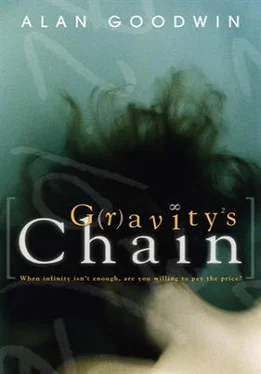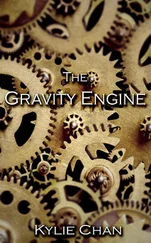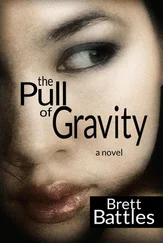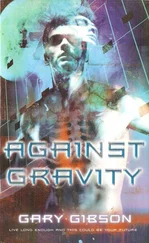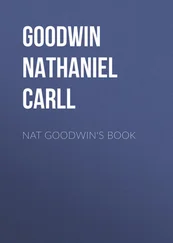Alan Goodwin
GRAVITY’S CHAIN
Gravity—A force of attraction between bodies that have mass. The greater the mass, the greater the attraction and the greater the force needed to break away.
For Peta, Carys and Toby—with love
I woke at four in the morning, stumbled through the debris of last night’s fight and poured my first Dos Gusanos of the day. The tequila stung my tongue. I paused to catch a breath before emptying the glass with one gulp and wiped away a dribble on my chin with the back of my hand. Carrying glass and bottle I returned to the living room with its dismembered furniture and poured my second. There were no curtains in the room. Dad said they ruined the view, ‘compromised’ I think was the word he used. When I was young we’d stand together and gaze at the sea, he in his maroon flannel shorts, me in black togs. He would lightly brush the top of my hair with the fingers of one hand while holding a pink plastic cup of lemonade with the other. Can you see all there is to see? he’d ask. All I could see was the sea, but I never knew if that was enough for him.
Sipping the tequila now, I sat with my feet perched on the cracked glass of the coffee table, watching the rays of a three-quarter moon ripple on the sea. The light was sufficient to reveal our violence in the night. Three chairs lay tipped over, their cane legs, turned dull chrome in the moonlight, strutted at every angle. Cushions, magazines and books, several with broken spines, were flung to all corners of the room and the glass of two bottles and three tumblers lined the floor at the back wall where they had been fired one after the other by Caroline as I dodged her missiles. Closing my eyes to this scene I listened to the waves gently breaking on the beach just thirty metres away.
I bear a grudge against this time of the morning, with the night’s heart gone and the day still to arrive. This is a void I regularly inhabit. Tequila helps pass the time before dawn when at last I no longer feel as though I’m the only man alive. But I have a taste for the booze then and it’s hopeless trying to stop. In recent weeks, as Caroline and I have widened the sudden fissure in our marriage with constant arguments, there’s been the added hope that drink may eradicate bad memories. Unfortunately, it seldom does that job. Caroline sobbing, her face distorted by anger, was as fresh as if she’d run from the room just moments before.
Our fight had been an ugly end to an otherwise good day—no, a better than good day. Although yesterday had begun at my witching hour, it had avoided the pitfalls of drink, because I found something other than tequila to fill the empty time. In contrast to today’s calm, the wind was strong, hurling surf at the beach. When I was a young boy, bad weather fascinated me. Storms that forced children my age to the safety of a parent’s bed drew me to a window or, on several occasions, outside. I remember Mother pulling me from the rain and pushing me inside where she would dry me off with an unnecessarily harsh rub of the towel. There was even a time in my early teens when I thought I might study storms seriously, using my prodigious mathematical skills to develop formulas to describe their structure. However, that was all before I discovered physics, before physics became my obsession. Like so much else, storms were then relegated to the realm of mere interest, but they could still grab my attention.
Yesterday morning rain had streaked the windows, forming patterns on the glass that consumed me. I sat cross-legged on the floor tracing the rivulets with my fingers: the greasy marks are still visible. How long I was there I’m not sure, but when I next glanced at the sea, the first shades of grey tinged the sky. Dawn had come to draw my attention. I had clawed my way to morning without drink and felt as relieved as a shipwrecked sailor washed ashore. This was a precious moment to seize, so the electronic whiteboard hummed into life and the chemical whiff of the marker pen irritated my nose as I uncapped red and black pens. I was working. And in my head were all those rain patterns on the window weaving together as they ran, changing shape in the altering light of the dawn. The memory of the weaving pattern was beautiful. These days work is too great a task if I think about it: it has to sneak up unannounced in a sober moment so I never have to consciously begin. The most successful days are those when I’ve written and printed a whiteboard page before acknowledging I’ve started. Yesterday I worked seven hours without food or drink. Without once stopping I stood at the board writing, then printing, then cleaning, page after page. The equations intensified through the day, my speed dropping as the difficulty of the maths increased. On each fresh page I wrote the word ‘weaving’ at the centre and arranged the equations around it like petals on a flower. In this way I pulled apart the maths of the strong nuclear force and reconstructed it in a new way. Like the rain patterns on the window, the maths appeared to weave.
Once finished I collapsed on the nearest chair, all my confidence instantly gone, shivering at the sudden break in my concentration. For all those hours I’ve gripped the maths so forcefully in my mind that I imagine it locked in my arms. When gone I empathise with the mother who has had her baby ripped from her grasp. This is the time for the dark bite of whisky. Tequila is my sunshine drink when I’m waiting for the light; it’s not enough to fill the emptiness after work. Whisky is the only one for that task. I always hope it will fend off the ugly thoughts that want to fill my suddenly unoccupied mind.
Minutes after I finished working, Caroline silently appeared in the room with a Glenfiddich in her hand. It was the first time I’d seen her all day. Whenever she wakes and finds me working she now leaves the house to avoid the risk of disturbing me. Just after we arrived at the bach a month ago she broke my concentration by making breakfast, the scrape of a plate on the bench and cutlery on china interrupting a crucial calculation. I ended up drinking furiously and the arguments raged. Finally she left and drove for several hours before returning once sure I’d passed out for the night. When working I’m oblivious of her whereabouts: only when I’ve finished do I wonder whether she has gone horse riding on the forest trails, or maybe painted now she has mastered landscapes and produced some of her most sumptuous work for years. I gulped the whisky, reached for the bottle Caroline had put on the table and poured again, almost to the rim. I needed distraction; otherwise there was danger of my falling into a very deep pit.
Caroline had been swimming now the storm was gone and the summer sun had returned. Her shoulder-length blonde hair was combed back wet, leaving her square face heavy but still beautiful. A black swimsuit revealed the total grace of her body. Think of her painting, I implored myself. Where might she have gone to paint today, the hills behind the bay, or maybe further inland to the bush, or even the estuary in the next bay with its solitary dilapidated house where Mrs Hunt has lived alone for thirty years? How hot she would have been—no wonder she took to the sea to cool her body. I faltered in my mental game. To avoid her I took my drink to the balcony, drained my glass, then dropped it to the grass below and gripped the wooden handrail so tight my knuckles turned white. A light wind brushed my face. The beach was deserted. The sea gently brushed the sand.
‘Have you been swimming, or just washing off the smell of a good shag?’ I said as I re-entered the room.
‘Swimming, but thanks for asking.’
Читать дальше
